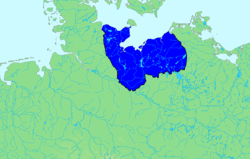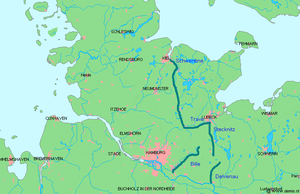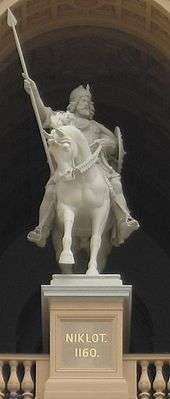Obotrites
The Obotrites (Latin: Obotriti) or Obodrites, also spelled Abodrites (German: Abodriten), were a confederation of medieval West Slavic tribes within the territory of modern Mecklenburg and Holstein in northern Germany (see Polabian Slavs).[1] For decades, they were allies of Charlemagne in his wars against the Germanic Saxons and the Slavic Veleti. The Obotrites under Prince Thrasco defeated the Saxons in the Battle of Bornhöved (798). The still heathen Saxons were dispersed by the emperor, and the part of their former land in Holstein north of Elbe was awarded to the Obotrites in 804, as a reward for their victory. This however was soon reverted through an invasion of the Danes. The Obotrite regnal style was abolished in 1167, when Pribislav was restored to power by Duke Henry the Lion, as Prince of Mecklenburg, thereby founding the German House of Mecklenburg.
Obotrite confederacy | |||||||||||||||||||
|---|---|---|---|---|---|---|---|---|---|---|---|---|---|---|---|---|---|---|---|
| 8th century–1167 | |||||||||||||||||||
 Coat of arms of the
House of Nikloting | |||||||||||||||||||
 Main territory of the Obotritic tribes | |||||||||||||||||||
 Expansion of the Obotrite confederacy under Prince Thrasco († 809) after victory over the Nordalbingian Saxons | |||||||||||||||||||
| Capital | Veligrad / Veligard (German: Michelenburg) | ||||||||||||||||||
| Common languages | Polabian Slavic, Old Saxon | ||||||||||||||||||
| Religion | Slavic paganism recorded main cults: supposed local minor cults Saxon paganism | ||||||||||||||||||
| Government | Hereditary Monarchy (Principality) | ||||||||||||||||||
| Prince | |||||||||||||||||||
• ?–ca. 795 (first) | Witzlaus | ||||||||||||||||||
• 1160–1167 (last) | Pribislav | ||||||||||||||||||
| History | |||||||||||||||||||
• Formed | 8th century | ||||||||||||||||||
• Accepted Saxon suzerainty | 1167 | ||||||||||||||||||
| |||||||||||||||||||
| Today part of | |||||||||||||||||||
Obotrite confederation
The Bavarian Geographer, an anonymous medieval document compiled in Regensburg in 830, contains a list of the tribes in Central Eastern Europe to the east of the Elbe. The list includes the Nortabtrezi (Obotrites) - with 53 civitates. Adam of Bremen referred to them as the Reregi because of their julve zlrade emporium Reric. In common with other Slavic groups, they were often described by Germanic sources as Wends.
The main tribes of the Obotritic confederation were:[2]
- the Obotrites proper (Wismar Bay to Lake Schwerin);
- the Wagrians (the eastern Holstein as part of Saxony);
- the Warnower (the upper Warnow and Mildenitz);
- the Polabians proper (between the Trave and the Elbe).
Other tribes associated with the confederation include:[2]
- the Linonen near Lenzen,
- the Travnjane near the Trave,
- the Drevani in the Hanoverian Wendland.
History
As allies of the Carolingian kings and the empire of their Ottonian successors, the Obotrites fought from 808 to 1200 against the kings of Denmark, who wished to rule the Baltic region independently of the empire. When opportunities arose, for instance upon the death of an emperor, they would seek to seize power; and in 983 Hamburg was destroyed by the Obotrites under their king, Mstivoj. At times they levied tribute from the Danes and Saxons. Under the leadership of Niklot, they resisted a Christian assault during the Wendish Crusade.

German missionaries such as Vicelinus converted the Obotrites to Christianity. In 1170 they acknowledged the suzerainty of the Holy Roman Empire, leading to Germanisation and assimilation over the following centuries. However, up to the late 15th century most villagers in the Obotritic area were still speaking Slavic dialects (Polabian language), although subsequently their language was displaced by German. The Polabian language survived until the beginning of the 19th century in Hanoverian Wendland, eastern Lower Saxony (bordering modern Mecklenburg-Western Pomerania).[3] The ruling clan of the Obotrites kept its power throughout the Germanisation and ruled their country (except during a short interruption in Thirty Years' War) as House of Mecklenburg until the end of monarchies in Germany in November Revolution 1918.
List of Obotrite leaders

| Ruler | Reign | Notes |
|---|---|---|
| Witzlaus | ?–ca. 795 | |
| Thrasco | ?–ca. 795-810 | |
| Slavomir | ?–810-819 | Ally of the Frankish Empire. In 816, he joined the rebellion of the Sorbs. Eventually captured and abandoned by his own people, being replaced by Ceadrag in 818. |
| Ceadrag | 819 - after 826 | Ally of the Frankish Empire. He rebelled against the Franks with alliance with the Danes, but later was reconciled with Franks. |
| Selibur | ||
| Nako | 954-966 | Nako and his brother Stoigniew were defeated at the Raxa river (955) by Otto I, after which Stoigniew was beheaded and Nako accepted Christianity, resulting in thirty years of peace. |
| Mstivoj and Mstidrag | 966 - 995 | Sons of Nako. They abandoned Christianity and revolted against the Germans (Great Slav Rising). |
| Mieceslas III | 919 - 999 | in 995 defeated by Otto III, Holy Roman Emperor. |
| Mstislav | 996 - 1018 | |
| Udo or Przybigniew | 1018 - 1028 | |
| Ratibor | 1028 - 1043 | |
| Gottschalk | 1043 to 1066 | |
| Budivoj | 1066 and 1069 | |
| Kruto | 1066-1069 and 1069-1093 | |
| Henry | 1093 - 1127 | |
| Niklot | 1131–1160 | Born around 1090. Also ruled the subdued Polabian Slav tribes of Kessinians and Circipanians. |
| Pribislav | 1160–1167 | Last Obotrite prince. Accepted Saxon suzerainty in 1167. |
The rulers of Obotrite lands were later the dukes and grand dukes of Mecklenburg.
See also
- List of Medieval Slavic tribes
- Praedenecenti
References
- Jensen, Carsten Selch (2006). "Abodrites" (PDF). In Alan V. Murray (ed.). The Crusades: An Encyclopedia. 1. Santa Barbara: ABC-CLIO. p. 3. OCLC 70122512.
- Herrmann 1970, pp. 7–8
- Polabian language
Literature
- Herrmann, Joachim (1970). Die Slawen in Deutschland (in German). Berlin: Akademie-Verlag GmbH.
- Turasiewicz A., Dzieje polityczne Obodrzyców od IX wieku do utraty niepodległości w latach 1160 - 1164, Warszawa 2004, ISBN 83-88508-65-2 (in Polish)
External links
![]()
- Emperor Charles the Great in 804 gave Saxon land to Obodrites, dispersed Saxons